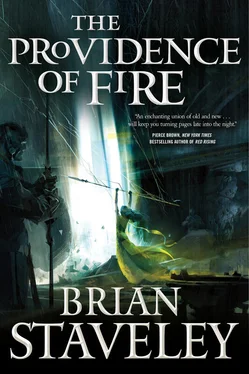Brian Staveley - The Providence of Fire
Здесь есть возможность читать онлайн «Brian Staveley - The Providence of Fire» весь текст электронной книги совершенно бесплатно (целиком полную версию без сокращений). В некоторых случаях можно слушать аудио, скачать через торрент в формате fb2 и присутствует краткое содержание. Год выпуска: 0101, ISBN: 0101, Издательство: Tom Doherty Associates, Жанр: Фэнтези, на английском языке. Описание произведения, (предисловие) а так же отзывы посетителей доступны на портале библиотеки ЛибКат.
- Название:The Providence of Fire
- Автор:
- Издательство:Tom Doherty Associates
- Жанр:
- Год:0101
- ISBN:9781466828445
- Рейтинг книги:4 / 5. Голосов: 1
-
Избранное:Добавить в избранное
- Отзывы:
-
Ваша оценка:
- 80
- 1
- 2
- 3
- 4
- 5
The Providence of Fire: краткое содержание, описание и аннотация
Предлагаем к чтению аннотацию, описание, краткое содержание или предисловие (зависит от того, что написал сам автор книги «The Providence of Fire»). Если вы не нашли необходимую информацию о книге — напишите в комментариях, мы постараемся отыскать её.
The Providence of Fire — читать онлайн бесплатно полную книгу (весь текст) целиком
Ниже представлен текст книги, разбитый по страницам. Система сохранения места последней прочитанной страницы, позволяет с удобством читать онлайн бесплатно книгу «The Providence of Fire», без необходимости каждый раз заново искать на чём Вы остановились. Поставьте закладку, и сможете в любой момент перейти на страницу, на которой закончили чтение.
Интервал:
Закладка:
Tevis narrowed his eyes. He had slipped his rapier back into its sheath, but kept one hand on the pommel.
“What do you mean by done ?”
“Just that,” Kaden replied evenly. “I am giving up the titles. Giving up the Unhewn Throne.”
Kegellen pursed her lips, flicked absently at one of her dangling earrings with a fingernail. “Giving them,” she asked mildly, “to whom?”
Kaden shook his head. “To no one. Perhaps I misspoke. I said I was giving them up. What I meant was that I plan to destroy them.”
The air in the room went suddenly taut as the summer sky before a storm. Kaden shifted his eyes from one face to the next, watching the reactions, memorizing them-the twitch of an eyelid here, a jaw clenched, a fingernail picking nervously at a fleshy knuckle. Tevis’s lips were drawn back in a half snarl, a cornered animal uncertain whether to attack or flee. Kegellen twisted a golden bangle absently around her wrist again and again, the motion as simple and repetitive as the moving meditations of the Shin.
“Then what?” Vennet asked finally. “No more empire? Back to the good old days when we all ran our own kingdoms?”
“We did not all have kings, Vennet,” Gabril said.
Vennet smiled a broad, contemptuous smile. “Of course. You desert dwellers will be overjoyed to return to your savage customs.”
“I’m sorry to hear that you consider his customs savage,” Kaden said, taking a small step to put himself between Gabril and the bearded man, “as I have drawn heavily upon them in my remaking of the empire.”
For several heartbeats no one said anything. Wind gusted through cracks in the warehouse walls, tugging at the lantern flames.
“Making it into what?” Vennet asked finally.
“A republic,” Kaden replied. “A government of shared responsibility.”
Tevis threw his hands in the air. “’Shael save us, a republic ? Meaning every filthy, dirt-grubbing peasant has a say and a stake?”
“It would be inefficient,” Kaden said quietly, “to bring every filthy, dirt-grubbing peasant to the capital for the sake of governance. I propose something more limited.”
Kegellen narrowed her eyes. “A council,” she said, tapping a finger against her fleshy lips. “You want to have a council.”
Kaden nodded.
“A council?” Tevis spat, lips drawn back in a sneer. “Of whom?”
“You,” Kaden replied. “You will provide the spine. Plus representatives from those atrepies who are not here in the city.” He gestured over his shoulder to Kiel, who slipped the rolled parchment into his hand. Kaden held the scroll up to the light, but made no move to unfurl it.
Vennet snorted. “What is that?”
“A document,” Kaden replied, “setting out the new laws, prerogatives, and responsibilities. A constitution.”
Kaden could never have come up with the thing on his own. After eight years in the Bone Mountains, he knew maybe one Annurian law in a hundred, and had almost no sense of the governing structures of foreign states and nations. He remembered from his childhood that Freeport and the cities north of the Romsdals formed a federation, that the Manjari had an empire like the Annurians, but with an empress instead of an emperor, and that the Blood Cities all insisted on their own independence, alternately fighting and trading with the others. It was an absurdly small base of knowledge for the drafting of a constitution that would govern a polity the size of Annur.
Gabril had proven useful, outlining the traditions of his people, as had Morjeta, whose training in the Temple of Pleasure had afforded her a surprising amount of time for the study of politics. In the end, though, it was Kiel who put it together. The historian seemed to know every detail of every human culture since the fall of the Csestriim. He anticipated the general problems of human governance, the specific problems posed by a transition from empire to republic, and provided plausible solutions to both. Morjeta and Gabril had both stared at the historian with increasing awe as they worked and reworked the document.
“How do you know all of this?” the First Speaker demanded at one point.
Kiel smiled. “It is my work.”
His raised his brows. “You memorized every detail, every name and date?”
“Yes,” he replied mildly, then gestured them back to the scroll.
Kaden had insisted on one thing only: that the document be simple. It was going to prove difficult enough to convince a score of suspicious, scheming nobles to put aside their historical rifts and grievances without presenting them with a five-hundred-page treatise. Kiel resisted, arguing that any lapses or oversights would lead, eventually, to the fragmentation and dissolution of the government, and the historian saw lapses and oversights everywhere. He wanted to address each possible contingency, outlining solutions to debacles ranging from assassination of council members to double taxation on long-distance merchants.
“I have studied republics, Kaden,” he said, shaking his head. “They start with the noblest of intentions, and they tear themselves to shreds.”
“How long does that take?” Kaden asked. “The shredding?”
Kiel spread his hands. “There are dozens of scenarios. Decades, sometimes. Maybe a couple of centuries. Not long.”
Triste laughed out loud at that. “If we make it through the next few months, I think we’ll all be happy. Come next summer, Kaden can start worrying about deflation and price-fixing and whatever else it is you’ve been talking about.”
“Come next summer,” Kiel replied, “Kaden will not be in charge. Not if we are successful.”
“One page,” Kaden said, cutting off the conversation. “We’re doing this to deny power to Adare and il Tornja, not as some experiment in the founding of a political utopia.”
“While we are doing one-” Kiel began.
Kaden shook his head, held up one finger. “One page.”
And so, as he stood in the damp warehouse, flanked by piled crates and musty barrels, ringed with hostile, baffled stares, it was one page that he held up.
“This,” he said quietly, “is the constitution I propose for Annur, an Annur ruled, not by an emperor, but by representatives from the various atrepies, people familiar with and dedicated to the traditions, history, and interests of their people.”
For a moment there was silence, the calculation of possibility and risk.
A slender, ink-skinned woman with red nails and a shaved scalp-Kaden took her for Azurtazine, from the southern island of Basc-shook her head. “How many?” she asked carefully. “How many representatives?”
“Forty-five,” Kaden replied. “Three from each atrepy.”
Azurtazine pursed her lips. “To be chosen how?”
“By you,” he said, “each for his or her own territory.”
Kiel had protested endlessly against the method, arguing that the nobles would scheme to promote their family and friends, then use their newfound power to crush both their political and personal foes. The new system, he pointed out, would be hopelessly tied to the interests of the few and the rich.
The point was a good one, but there was no chance that these remnants of an old world order, families who had spent hundreds of years hoarding their grievances and counting their slights, would allow any government in which they were forced to share power over their own restored lands. Doubtless there were better systems, but il Tornja and Adare would not be fighting the Urghul forever, and by the time they returned, the fledgling republic needed to be established firmly enough to deny them power.
“It seems like you’re giving up a lot,” Triste had said, shaking her head as she studied one of the final drafts.
Читать дальшеИнтервал:
Закладка:
Похожие книги на «The Providence of Fire»
Представляем Вашему вниманию похожие книги на «The Providence of Fire» списком для выбора. Мы отобрали схожую по названию и смыслу литературу в надежде предоставить читателям больше вариантов отыскать новые, интересные, ещё непрочитанные произведения.
Обсуждение, отзывы о книге «The Providence of Fire» и просто собственные мнения читателей. Оставьте ваши комментарии, напишите, что Вы думаете о произведении, его смысле или главных героях. Укажите что конкретно понравилось, а что нет, и почему Вы так считаете.












